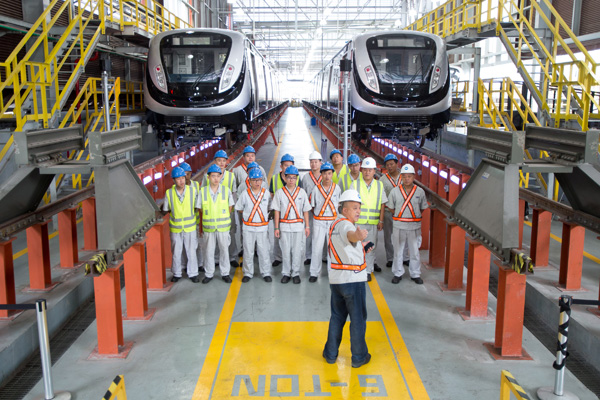 |
|
Technical staff from China CNR Corporation's Changchun Railway Vehicles Company prepare for the use of two new made-in-China subways on May 11 at Rio's subway station services segment. [Photo by XU ZIJIAN / FOR CHINA DAILY] |
When you go to work in in Rio de Janeiro, the subway train you get on may be made in China. If you cross the Guanabara Bay to head to the neighboring town of Niteroi, the ferry boat that takes you there can be made in China. You can enter a school and find a class studying Chinese. Made-in-China is making Brazilians' lives easier.
New trains on the two subway lines in Rio were manufactured in China. The new Line 4, which is expected to be ready for next year's Olympic Games, will also use Chinese trains. And urban railway company Supervia, whose trains connect the city center to the blue-collar suburbs, bought trains from China.
There are 19 Chinese trains running in Rio, with a capacity to transport 840,000 passengers each day. They were manufactured by China CNR Corporation's Changchun Railway Vehicles Company.
At the entrance of the Cidade Nova subway station, one sees a sign, "Your life begins here". Melene is one of the locals who take the subway to work every day. She said the new trains are much more comfortable, and, most importantly, cool. "Everyone knows Rio is always very hot, so a working air conditioner is very important," she said.
Chinese trains not only have better air conditioning, but they also have electronic maps, LED lamps and cameras.
Wang Huaifeng, commerce director at CNR's international division, said that the subway trains were designed especially for Brazil, taking into consideration actual operating conditions, including temperature and passenger capacity.
Pedro Augusto, director of the subway's Line 4, said that subway company Metro Rio signed a contract with CNR in 2009. The first shipment of 19 trains was delivered, and five of the 15 trains in the second shipment are in Rio.
"I will go to China on May 22 for the ceremony of completion of the 15th train, which means that the second shipment is entirely ready. The trains are very good and increase the transport capacity of Rio's subway system. The Chinese trains are cheap, but modern and comfortable. We are very happy," he said.
In Chinese boats
Due to the high cost of living in Rio, many people live in neighboring Niteroi, but they work in the state capital because that's where most jobs are, so they must take a ferry across the Guanabara Bay every day.
Many of the ferries were made in the 1960s and 1970s. But one blue ferry stands out, the Pao de A?ucar (Sugar Loaf in Portuguese), which was manufactured in China.
"The new ferry came this year, and every day I hope I can catch it, because it is the most comfortable one. Taking this ship to work, I can be in a good mood all day long!" said Marcio, a bank teller.
Inside the Sugar Loaf, the only air-conditioned boat among Rio-Niteroi ferries, there are various amenities, including drinking water, toilets, a bar, seating for disabled people and bike racks.
Boat captain Jorge Oswaldo de Freitas said he feels "very good driving the boat. And this ship always requires two crew members in the cockpit, and that guarantees safety."
Peng Liang, a Chinese engineer with China Shipping's Afai Shipyard, said that in the first year after delivery, Chinese engineers are on the ferry every day to solve any problems or concerns from the Brazilian side.
The Sugar Loaf makes jut six trips during rush hours. Many passengers complain about not being able to travel on the ferry, but that will not last long because the Rio de Janeiro state government bought seven similar ferries, and those are coming.
Bilingual school
The Joaquim Gomez de Souza Math High School, located next to the beach in Niteroi, is the first Brazil-China bilingual school in the country. You can hear the Chinese greeting of "Ni Hao!" when you enter.
Cai Zhaoliang, a volunteer teacher from the University of Hebei, China, is running a Chinese -language class:
"What's your name? What's your name in Chinese?" "My name is Han Jiarui." "My name is Mo Manni."
All students in the school have a Chinese name. Besides the language, they also learn the traditional Chinese instrument Hulusi, Chinese chess and calligraphy. Tai Chi Chuan and Jian zi were added to physical education classes. Occasionally, the school organizes exhibitions of traditional Chinese culture and takes students to the theater to see Chinese performances.
Professor Cai Zhaoliang, volunteer teacher from the University of Hebei, teaches at the school and also gives Chinese courses at the Confucius Institute of the Pontifical Catholic University (PUC) of Rio de Janeiro. According to him, "Teaching at the Confucius Institute is very different from the college, where all students already have a satisfactory level of English. Here many students cannot communicate with us in English. We have to study Portuguese, or ask for help from teachers in English for translations."
All Chinese teachers at the school live in Rio, and spend more than two hours commuting to Niteroi. Li Su Tianke, another volunteer teacher, said that "every day I get up at four in the morning to teach a class at seven at the school. But my students are making progress every day. To me, it is a great success. And I do not feel so tired. The students and their progress compensate for all the tiredness."